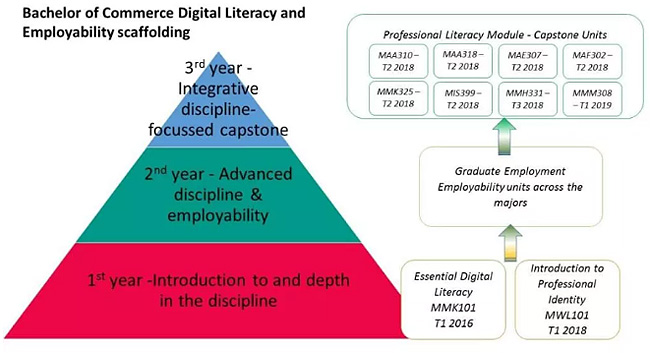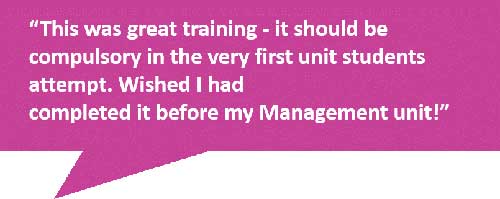By Simone Tyrell, Faculty of Business and Law Digital Literacy Programs Librarian, Deakin University Library
The Professional Literacy Suite (PLS) is the first suite of online digital and professional literacy modules created at a course wide level at Deakin University. Digital and professional literacy and employability skills were identified as educational skill gaps as part of the course renewal process for Deakin’s largest undergraduate course, the Bachelor of Commerce (BCom). In response to this, a multi-disciplinary project team was created, the Digital and Professional Literacy team, drawing upon complementary academic and professional expertise across the course leadership and unit teams, the Faculty of Business and Law Learning Innovations team and the Library team. Tasked with creating a systematic, sustainable solution to enable reuse by other courses, we built a suite of embedded digital literacy modules. Strategically designed and scaffolded across the course, the modules ensure students develop digital literacy skills, professional insight and support employability. Delivered wholly online, the PLS provides a consistent and equitable experience for all students during their studies ensuring equal access to both cloud and campus students.
 The PLS comprises three elements: Essential Digital Literacy (EDL), Introduction to Professional Identity (IPI) and Professional Literacy (PL). The modules include interactive and media-rich elements that are visually engaging, centred on strong learning design and scenario-based learning (SBL). Contextualised in authentic work-based settings, the design enhances student learning and empowers learners for the jobs and skills of the future. The embedded activities, quizzes and feedback encourages students to engage in active learning and provide skills for both their studies and future employment. The modules, while formative, are hurdle requirements students must complete before submitting summative assessment tasks that follow. Constructive alignment is evident across learning outcomes, assessment and activities, using a student-centered approach, conveying clear objectives and opportunities for students to engage in active learning (Biggs & Tang, 2007).
The PLS comprises three elements: Essential Digital Literacy (EDL), Introduction to Professional Identity (IPI) and Professional Literacy (PL). The modules include interactive and media-rich elements that are visually engaging, centred on strong learning design and scenario-based learning (SBL). Contextualised in authentic work-based settings, the design enhances student learning and empowers learners for the jobs and skills of the future. The embedded activities, quizzes and feedback encourages students to engage in active learning and provide skills for both their studies and future employment. The modules, while formative, are hurdle requirements students must complete before submitting summative assessment tasks that follow. Constructive alignment is evident across learning outcomes, assessment and activities, using a student-centered approach, conveying clear objectives and opportunities for students to engage in active learning (Biggs & Tang, 2007).
The EDL and IPI sit in compulsory first year units, assisting in developing digital literacy and professional skills for employability, as well as the required skills for studying. The EDL uses a SBL approach where a threaded narrative guides students through the module’s content and activities, connecting each section together in a logical way. This SBL approach was specifically chosen to generate authentic and deep learning experiences in higher education (Agostinho, Meek, & Herrington, 2005; Diekema, Holliday, & Leary, 2011).  The IPI guides students through the importance of creating and managing a professional identity, whilst also requiring students to consider how a prospective employer may view their current online profiles. PL sits in the third-year compulsory capstone units of all majors across the BCom. The PL takes the students through existing digital literacy skills, refreshes and then extends them to transition to the workplace and build on their careers. Alignment across all the BCom majors ensures students continue developing their digital literacy skills throughout their University experience. The inclusion of SBL and authentic activities, ensures the PLS supports active learning strategies simulating a workplace (Clark & Mayer, 2012; Dahl, 2004).
The IPI guides students through the importance of creating and managing a professional identity, whilst also requiring students to consider how a prospective employer may view their current online profiles. PL sits in the third-year compulsory capstone units of all majors across the BCom. The PL takes the students through existing digital literacy skills, refreshes and then extends them to transition to the workplace and build on their careers. Alignment across all the BCom majors ensures students continue developing their digital literacy skills throughout their University experience. The inclusion of SBL and authentic activities, ensures the PLS supports active learning strategies simulating a workplace (Clark & Mayer, 2012; Dahl, 2004).
The modules leverage off the unique interactive and adaptive technologies of Tumult Hype and Smart Sparrow. Capitalising on feedback from teaching teams and students, the modules are continually reviewed for improvement. The exemplary adaptive learning design of the PLS, provides students with feedback based on their performances and learning in the modules. Working directly with Smart Sparrow vendors we have increased the capability and core functionality of the platform, creating an innovative scalable solution. Use of the ‘Class’ and ‘Grades integration’ tools, enables the identification of prior student completion facilitating mass implementation, scaled across the Faculty and University.
The PLS also requires students to self-assess their digital literacy skills prior to beginning, and then post-completion. The inclusion of qualitative questions provided overwhelmingly positive feedback from students, who stated,  “This was great training – it should be compulsory in the very first unit students attempt”, and, “it proved to be greatly beneficial to my studies, I now don’t feel quite so overwhelmed when it comes to referencing and assignment research, I also feel more confident in utilising the library resources”. Beyond the knowledge and skills developed, the design of the PLS was identified as a key benefit. That is, students perceived “the module was interactive, easy to
“This was great training – it should be compulsory in the very first unit students attempt”, and, “it proved to be greatly beneficial to my studies, I now don’t feel quite so overwhelmed when it comes to referencing and assignment research, I also feel more confident in utilising the library resources”. Beyond the knowledge and skills developed, the design of the PLS was identified as a key benefit. That is, students perceived “the module was interactive, easy to  follow and has great information”, and that there was a “massive amount of information provided”. Further, students also reported that the benefits of the modules enabled them to develop further, as self-directed learners, as “more than informative, I believe it has mostly built up my confidence” and that they will “use the knowledge gained for my studies and career”, clearly empowering our students for the jobs and careers of the future.
follow and has great information”, and that there was a “massive amount of information provided”. Further, students also reported that the benefits of the modules enabled them to develop further, as self-directed learners, as “more than informative, I believe it has mostly built up my confidence” and that they will “use the knowledge gained for my studies and career”, clearly empowering our students for the jobs and careers of the future.
First embedded in 2016, over 12,500 students have now completed the modules. Students’ academic achievement of course learning outcomes provide a clear measure of the success of this innovation. Achievements in subsequent assessment tasks, requiring digital literacy skills, improved markedly by more than one grade level. Further, students’ self-reported confidence levels in their digital literacy skills resulted in 98% of all students being either confident or extremely confident after completing the modules. Student satisfaction has also markedly improved over time with whole of course improved eVALUate results (student evaluation of the unit, its resources, experiences and the teaching within it) since the PLS’s implementation in T1 2016. The success of the PLS scaffolded across the BCom has led to it being implemented across two more business courses in the Faculty of Business and Law, with the view of all business courses being included going forward.
To have a closer look, you can visit our Professional Literacy Suite blog page at www.bit.ly/pls18
We will be conducting a webinar called ASCILITE Live! Webinar: A multidisciplinary approach to embedding digital literacy across the curricula, on Monday July 29 @ 12:00 pm – 1:00 pm AEST in which we will provide more details on the Professional Literacy Suite project. You will also have the opportunity to see how the modules are embedded within the student Learning Management System, interact with the modules themselves and consider how it may be applied at your own institutions. To register, visit the ASCILITE website and register at the bottom of the page.
Reference list
Agostinho, S., Meek, J., & Herrington, J. (2005). Design methodology for the implementation and evaluation of scenario-based online learning environment. Journal of Interactive Learning Research, 16(3), 14.
Biggs, J. B., & Tang, C. S.-k. (2007). Using constructive alignment in outcomes-based teaching and learning. In Teaching for Quality Learning at University (3 ed.): Maidenhead: McGraw-Hill/Society for Research into Higher Education & Open University Press.
Clark, R. C., & Mayer, R. E. (2012). Scenario-based e-Learning: evidence-based guidelines for online workforce learning. Somerset, UNITED STATES: Center for Creative Leadership.
Dahl, C. C. (2004). Scenario-based active learning in a low-tech environment. College & Undergraduate Libraries, 11(2), 17-28.
Diekema, A. R., Holliday, W., & Leary, H. (2011). Re-framing information literacy: problem-based learning as informed learning. Library and Information Science Research, 33, 261-268. doi:10.1016/j.lisr.2011.02.002
Acknowledgements
I wish to acknowledge the other members of Digital and Professional Literacy team:
Assoc. Prof Kerrie Bridson
Dr Leanne Ngo
Mr Michael Volkov
Ms Kim Phu
Ms Sharon Chua.
